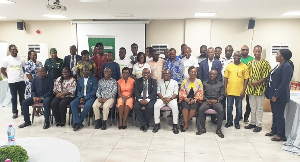The Pro Vice-Chancellor of KNUST, Professor Ellis Owusu-Dabo, has unveiled the "Responsible AI for Developing a Robust Public Health Surveillance System: Early Detection and Prediction of Vector-Borne Viral Zoonotic Pathogens (RAPID-VBP)" project.
This was launched at its first stakeholder consultation workshop for the AI4PEP RAPID-VBP Project on May 20, 2024.
The AI4PEP RAPID-VBP project, led by Dr. Kingsley Badu with co-investigators Dr. Edmund Ilimoan Yamba and Dr. Rose-Mary Owusuaa Mensah Gyening, is funded by IDRC Canada.
Its primary goal is to pioneer responsible artificial intelligence tailored for a robust public health surveillance system, with a sharp focus on the early detection and prediction of vector-borne viral zoonotic pathogens (RAPID-VBP).
The project is in collaboration with Mahidol University in Thailand and the University of York in Canada.
The core concept driving this initiative is the development of an AI-based automated vector surveillance system, coupled with risk-targeted early detection surveillance and supported by climate-driven predictive models.
The objective is to identify emerging viruses in insect vectors, humans, and animals before they escalate into widespread diseases, thereby fortifying preparedness against looming pandemics.
Dr. Kingsley Badu, the principal investigator of the project, explained that the initiative leverages existing malaria surveillance infrastructure, adapting it to detect all vector-borne diseases. This enhancement significantly bolsters Ghana's public health defense mechanisms.
He emphasized the critical need for such a system in Ghana, noting that the lack of robust surveillance allows unidentified infections to proliferate in vulnerable populations, thereby overwhelming the country's healthcare infrastructure.
Dr. Badu believes that the project has the potential to markedly improve Ghana’s public health surveillance system, aligning with KNUST’s commitment to social impact.
Professor Ellis Owusu-Dabo highlighted that the project's core principles—early detection, early warning systems, early response, and passive development—align with the university’s mission for societal development.
He commended the team for their efforts and assured them of management’s commitment to the project’s success.
Dr. Franklin Asiedu-Bekoe, the Director of Public Health at the Ghana Health Service, underscored the necessity of integrated strategies for preventing and controlling vector-borne diseases, citing the effectiveness of integrated vector management (IVM) and the importance of surveillance, early detection, and response systems in containing outbreaks.
Professor Leonard Amekudzi, the Provost of the College of Science, highlighted that the workshop and its inception represent a significant advancement in applying artificial intelligence to public health.
He stressed the importance of a one-health approach and called for multidisciplinary collaboration and sustained efforts to combat vector-borne diseases.
Regional News of Monday, 27 May 2024
Source: dr. daniel norris bekoe

















